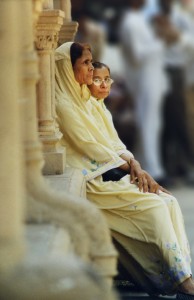The Bharatiya Muslim Mahila Andolan led by Muslim women, works towards the empowerment of Muslim women and diminishing the marginalisation of Muslim community
By Noorjehan Safia Niaz and Zakia Soman
Muslims, the largest minority in India, have poor human development status- widespread illiteracy, low income, irregular employment as documented by various agencies – implying thereby a high incidence of poverty and marginalisation. Muslim women suffer from multiple marginalisations facing not just poverty, lack of education, inequality and lack of opportunities but also of living in a marginalised minority community which is deeply influenced by religious patriarchal forces.
The rise of communal and conservative forces made matters worse resulting in increased insecurity and sense of alienation within the community. The rise of terrorism and the impact from the so-called war on terror, the increasing negative impact of the forces of imperialism and capitalism has led to the Muslims being a community under siege. In this context the issues of the Muslim women are put at the back burner.
Thus a strong need was felt to create a collective that will not only address the concerns of the Muslim community, particularly of the Muslim women but also take concrete steps to ameliorate this situation. It was felt that a mass organization is required where the most oppressed and marginalised sections get a voice and are able to mobilize themselves.
With this context in mind, some Muslim women got together and formed the BMMA or the Indian Muslim Women’s Movement in January, 2007. Forming Bharatiya Muslim Mahila Andolan [BMMA] was the first step in that direction where the Muslim women not only take leadership of their own issues but also issues of the community. In its sixth year the BMMA’s membership has crossed 30,000 members across 15 states. Our membership is open to all, including men, who share our vision and mission.
BMMA is a national, autonomous, secular, rights-based, non-party political and mass organisation led by Muslim women working towards understanding and ameliorating the marginalisation of Muslim community and Muslim women and to work towards empowering Muslim women and take steps to ensure their social, economic, political, civil, legal and religious rights. It wants to take forward the process of legal reforms within the Muslim personal law.
BMMA wants to understand the caste hierarchies within the Muslim community and raise the issues of Dalit Muslims. In all, it wants create an alternative progressive voice within the Muslim community. It also seeks to collaborate and build alliances with other movements and networks that are fighting for social equality and human rights.

Photos by Ramlath Kavil
The BMMA believes that no movement can succeed if it is not able to fulfill the basic needs and requirements of the people who join it. Women who are extremely marginalised and face dire poverty on a daily basis cannot afford to listen to empty talks and slogans. This was evident to us in our very first year when women asked the BMMA how the membership money that they pay would make any difference to their lives. Aapko membership ka paisa dekar hame kya milega? The leadership of the Andolan was galvanized thus to mobilise Muslim women around their concerns and take initiative and concrete steps to help them fulfill their needs.
For BMMA political advocacy is not confined to doing submissions to Planning Commission, or to the National or State Minority Commissions but the focus is more on mobilising Muslim women to build community pressure on the local ration shop owner, local ration office, local hospitals and clinics, give letters of demands to ward officers, to health officials, to education ministers, to local corporators, MLA and MPs. Advocacy has been encouraged at the grassroots by village and districts leaders.
Activities of BMMA at the local, state and national level include facilitating the emergence of Muslim women’s leadership in society, campaigning for the implementation of the recommendations of Sachar Report, campaigning for reforms in the Muslim Family Law, facilitating Muslim women to raise her voice against the conservative, communal and fascist forces and engaging with Muslim girls for their educational and social empowerment. In the last 5 years the BMMA has been able to develop the leadership of Muslim at the national, state, district and to some extent in some states at the block level also. In each state Muslim woman’s leadership has emerged in at least 5-6 districts.
BMMA’ apex decision making body, the National Council, comprises of the founder members as well as the state leaders. Each state is headed by the State Council which comprises of state leader along with district leaders. Thus the structure goes down to the village level. The day to day activities of the Andolan is monitored by the National Working Committee. Internal communication and coordination is carried out by the National Secretariat based in Mumbai. The National Council meets regularly to take programmatic and administrative decisions and sets achievable goals every year which are in consonance with its vision and objectives.
In the coming years we hope to reach out to more states and thus to more Muslim women for creating a just and humane society.
Noorjehan Safia Niaz and Zakia Soman are founder members of BMMA and have been working for many years extensively across the country to mobilise Muslim women’s leadership.